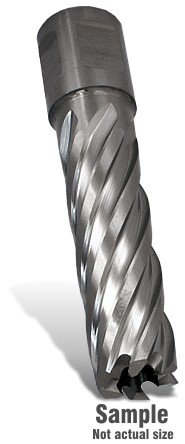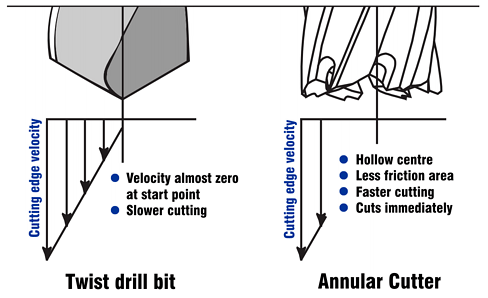Annular Cutter: Ø 16 mm
 One
way to avoid dimpling and deburring while making holes in tube and pipe is to use
annular cutters. Because annular cutters are hollow on the inside, there is no dead-zone
resistance to overcome.
One
way to avoid dimpling and deburring while making holes in tube and pipe is to use
annular cutters. Because annular cutters are hollow on the inside, there is no dead-zone
resistance to overcome.
Using a twist drill to make holes in pipe or tubing can prompt concerns about the hole roundness, location accuracy, hole finish, chip extraction, burrs, and drilling duration.
The focal point of these concerns is the twist drill's most noticeable feature; its point. This is not really a point at all, but the tangent line where two cutting angles intersect at the web of the drill, or the so-called 'dead zone.' This dead zone causes the surface speed of the cutting edges to drop to zero.
The lower surface speed reduces cutting efficiency and requires increased thrust, or feed pressure, for the cutting edges to push through the material.
Compared to traditional tooling (twist drills, etc.) annular cutters can multiply your cutting speed by up to 3 times while getting a longer tool life, a more accurate hole, a better finish, with no burrs. The cutting edges distribute the cutting load evenly, thus making it faster cutting.
Annular cutters convert a smaller area to chips, requiring less horsepower and thrust. This feature provides longer tool life and less chatter. The slug also offers a higher scrap value than loose chips and shavings.
Refer to the picture shown below, explaining why annular cutters are more efficient and faster than twist drill bits.

Definition - Annular
'Ring-shaped' or 'forming a ring'. From the latin word annulus




